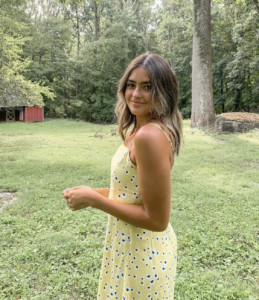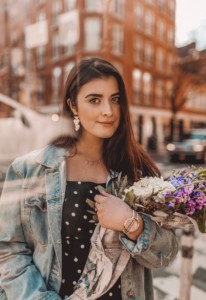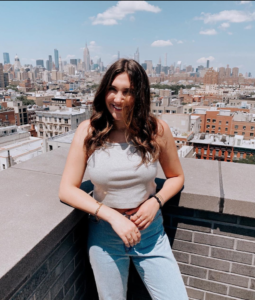The episode starts with an upbeat jingle as the show’s host welcomes listeners back for another 45 minutes of semi-scripted audio content. Her voice is young, but sophisticated. Her tone is casual, but authoritative. She is in control as she addresses the audience she’s created, grown, and cultivated for the better half of the last decade. The cover of her podcast exudes millennialism with its soft pastels, clean lines, and her own image cartoonized to the right. She records from her bedroom with a mic bought off Amazon. When she’s done, she’ll pick up another tool—her phone or a camera—that helps transform her life from the present moment to a digitized version for hundreds of thousands of subscribers to follow along with on the internet. Though I’m describing Natalie Barbu and her podcast, The Real Reel, I could be talking about any of the hundreds of podcasts hosted by young women who identify themselves as “influencers.”
And this becomes the problem for influencers. Their life is their content.
The term “influencer” is almost as new as the intense mainstream attention podcasting has received. It refers to anyone with a following on social media who earns money through sponsored content. In other words: people who are paid to encourage their fans to buy or try a product or service. They’re not all young women, but this demographic is often the most recognized aspect of the industry. Their fans, though again not all of them, also tend to be young women.
Those who identify with the term are regularly criticized for not having “real jobs” or not doing enough meaningful work. Influencers are told they’re lazy, entitled, dumb, or out of touch. Sometimes, they even feel that way about themselves. When Barbu quit her more traditional 9-5 job at Accenture, she told fans in a video that “I’m not just going to be doing YouTube, I don’t even like watching people who just do YouTube.” But among all the criticism, societal or self-inflicted, one thing they truly are is underestimated.
By 2022, brands will spend up to $15 billion dollars on influencer marketing campaigns, according to Business Insider, probably because 49 percent of consumers depend on recommendations made by their favorite social media personalities. Influencers build careers because they know how to attract, retain, and grow a following, something future podcasters might want to learn. Each creator is running her own small entertainment factory with products coming off the supply belt in the form of YouTube videos, Instagram posts, and Twitter thoughts. So when these women create podcasts, it’s about more than a fun, exciting medium. It’s a strategic business move.
Barbu started her interview-based podcast, The Real Reel, in March of 2019. The goal of the podcast is to provide a platform for guests to talk about their “real” life, not their highlight “reel”—a common criticism of social media culture. For 45 minutes every week, Barbu interviews guests ranging from her boyfriend to college sorority sisters to founders of $20M beauty brands. The conversations usually center around entrepreneurship, overcoming adversity, work/life balance, school, and achieving goals. “I knew a lot of people who had interesting stories to tell, and I had a platform where I could share it,” she says.

The “platform” she’s referencing wasn’t the actual podcast—at least not yet. Barbu got her start on YouTube, where she now has over 285K subscribers. Those fans have subsequently bled into other social networking sites like Instagram, where she has a little under 60K followers. Her videos range in tone and style, but often include “vlogs” (video blogs) of her day-to-day life. Fans have followed her through most of her young adult and adolescent life, from her time in college at North Carolina State University studying industrial engineering to her first “adult” job in consulting at Accenture to her decision to quit the corporate world and pursue her own entrepreneurial endeavors full-time.
As YouTuber, Instagrammer, and podcaster Dakota Lynne puts it, creating sustainable business models on social media is “all about cross-platform pollination.” Essentially, growing one outlet by promoting it on another, and vice versa. Lynne just launched her podcast, Optimist Hour, this past June, though she’s taking a break as she settles into her new life and apartment in New York. The idea is that as one platform increases in popularity, so do the others.

So when starting The Real Reel, Barbu had a cushion of devoted fans she could tap and a place to promote the podcast too. “I pretty much knew that people from social media would be my first listeners, so I really did rely on the followers I already had,” she says. This isn’t unusual in the influencer world, and it does give them an edge over other podcasters. But these followers don’t always make the transition between platforms easier or even guarantee success. Sometimes they create unique problems others without a following might never encounter.
Katy Bellotte had just graduated from Elon University, moved to New York City, and was starting her first corporate job at L’Oréal when she launched her podcast Thick and Thin. In each episode she shares stories from the past week. “I think of it like how I talk to my friends when I haven’t seen them,” she says. Bellotte has shared details from her love life, insights into her career, and funny things that have happened with friends. She’s open and honest, divulging the “thick and thin” of her own life. “I’ve realized I have to live my life in order for content to even appear on the podcast,” Bellotte says.

And this becomes the problem for influencers. Their life is their content. They ultimately are the subject of everything they create, and when they produce this work across multiple platforms, it can become extremely difficult to not only differentiate what goes where, but to ensure that their fans stay engaged with everything they do.
“You run out of content, especially when your life is content and you’re not doing much,” Brooke Miccio, an influencer who co-hosts the podcast Gals On The Go told me. “Or you shouldn’t be doing much,” she follows up quickly, in reference to one of the many ways the coronavirus pandemic is changing nearly every industry. When I spoke with Miccio, she explained that this has become one of the most challenging aspects of starting a podcast. Barbu agreed, saying, “It’s really hard to diversify your content. It’s really hard to make your podcast different from your YouTube channel and then different from your Instagram.”

Most influencers recognize this issue before starting the podcast. Before any of them launched their shows, they spent a lot of time figuring out what type of content could work in an audio format and worked out ways to try to differentiate their podcast from the beginning. “I’ve been finding ways to separate my messaging and compartmentalize it into what to put on YouTube and what to put in the podcast,” says Lynne. “I want to be more open-hearted and business oriented on my podcast.” She’s trying to focus on sharing more intimate aspects of her life, like her financial journey. Bellotte took a similar approach. She shares more personal details of her life on the podcast, details that she wouldn’t put on YouTube.
The interview style of The Real Reel helps Barbu ensure that she’s offering something different to her listeners. And Miccio is a co-host; her podcast is also run by a fellow YouTuber and content creator Danielle Carolan. By doing it together, they provide something that isn’t available to any of their fans separately.
The solutions are clearly working, even if influencers worry they’re getting repetitive. While not everyone I spoke to felt comfortable sharing statistics on their streams and listernerships, Barbu explained that the number of followers on their podcast-specific Instagram page acts as a great “sample size” of devoted fans. Bellotte averages “30,000-40,000” streams per episode, she says. Compare that to the 3,300 followers on Thick & Thin’s Instagram page, and you can start to put together the rough correlation. The Real Reel has about 2,500 followers on Instagram and Gals on the Go has over 30,000.
For influencers, podcasts—with their lack of public analytics—are safe, refreshing alternatives to every other medium the influencers have experienced. Many of them have grown up with front row seats to the critical side of the internet. On other platforms, anyone can speculate or criticize when their subscriber count drops or a video doesn’t perform well. Internet “trolls” can easily fill in their own perceptions of the video, photo, or other content. “If one [podcast] episode flops, no one knows.” Bellotte says, “No one knows how many subscribers or how many people are following me and it’s so refreshing!” The pressure decreases and the watchful eyes that seem to be waiting for them to mess up suddenly disappear.
The absence of analytics and a comment section doesn’t just benefit the influencer. The soft wall it creates comforts the creator so the actual content of the episode is more special for the audience, “It feels very personal,” Bellotte explains. Miccio echoed this sentiment, saying, “I get to be a little more vulnerable, there’s no camera in your face.” The authenticity and transparency podcasts create is often what attracts fans to the podcast in the first place. It lets followers get a more intimate look at some of their favorite people they may never actually know.
But podcasting is, ultimately, still their job. The sheer amount of influencers who start podcasting says a lot about the industry they work in. “There’s a lot of pressure to jump on every social media trend or every platform just in case, because it’s our livelihood,” Barbu says. Lynne says she “feels pressure everyday.” And if the stress wasn’t there just from the nature of the trade, it often comes from fans themselves. It’s not uncommon for content creators to field daily messages from eager fans begging them to start a podcast. The lines between hobby, service, and obligations are easily blurred when your life becomes your job.
Despite everything, for these influencers, podcasts still remain one of their favorite products to create. For Bellotte, her motivation comes from the impact her podcast has on her listeners., “People really need it, sometimes they feel like they don’t have a friend to talk to,” she says. She loves that she can be that person for thousands of people. Lynne likes that podcasts feel much more casual and have opportunities for growth. “I’d love to grow it to be one of my more prominent platforms, it’s something that I see a lot more longevity with as opposed to even YouTube or Instagram because it’s such a flexible platform,” she says.
Barbu and Miccio take a more business-minded approach. “The networking opportunity is huge, I have met so many amazing and cool people, and so many opportunities have come from me having someone on my podcast,” Barbu says. Miccio and her co-host have created an entire brand around Gals on the Go, including merchandise that consistently sells out, and a sold-out live show that was unfortunately postponed due to the COVID-19 pandemic. Ultimately, “it’s an industry that changes all the time,” Miccio says, “I like being in a space where there’s so much potential.” Spoken like a true entrepreneur.
Editor’s note: We’ve collected each influencer’s favorite episode below for you to sample.
Natalie Barbu
Brooke Miccio
Katy Bellotte
Dakota Lynne




Comments